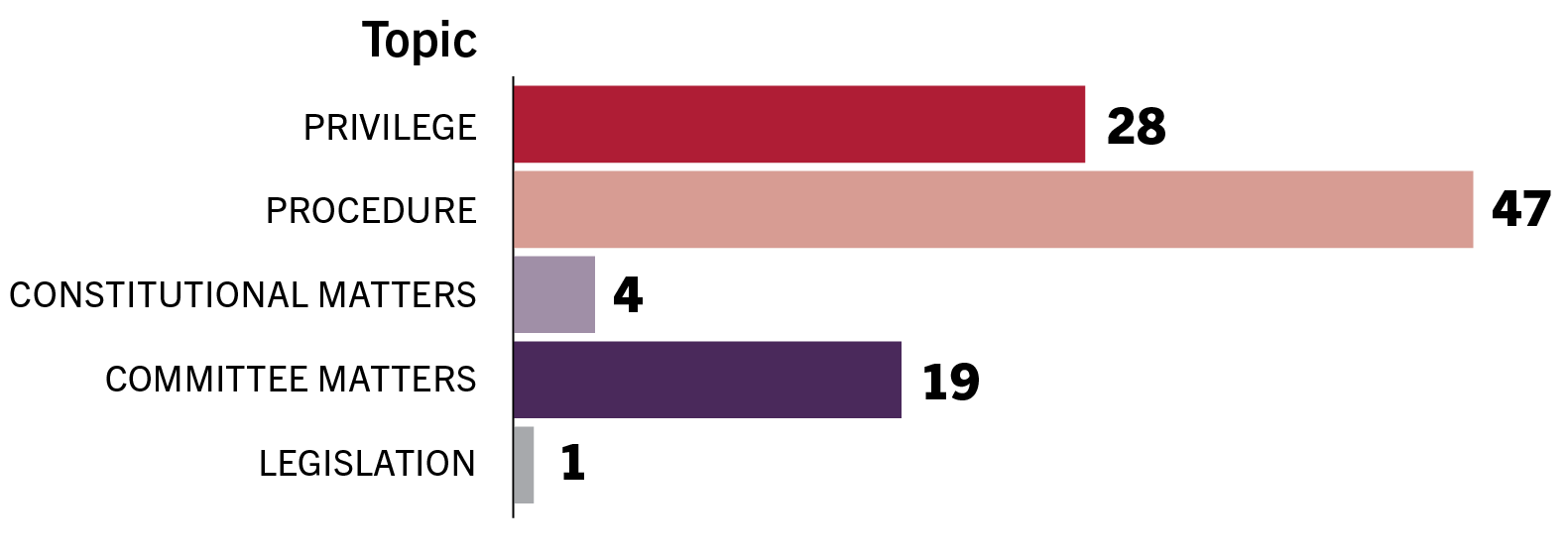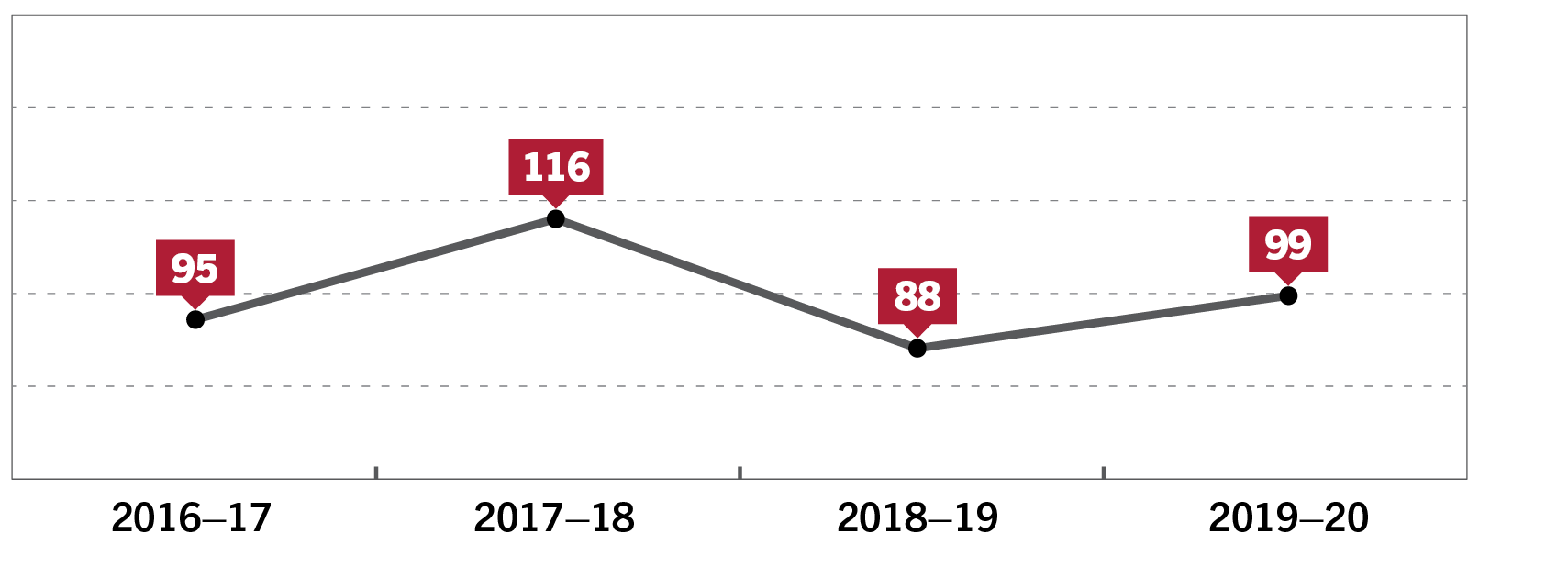| Outputs |
|
Advice on, and support for, proceedings of the Senate and its committees.
Leadership and strategic direction for the department.
Secretariat and advisory support to the Procedure and Privileges Committees.
Procedural information and related resources for senators and the department.
|
Advice and support are sound and timely, and provided to the satisfaction of the President, other officeholders, Senate committees and senators so that they are able to fulfil their roles. |
Senators and other recipients of advice on powers, privileges and proceedings continued to acknowledge its accuracy and value.
Advice and support was invariably provided in time to meet procedural and operational requirements.
|
The capacity of the department and its employees to provide advice and support meets operational requirements. |
Activities under the learning and development framework underpinned the department’s advisory and support capacities. |
Governance structures advance the department’s accountability and the achievement of its outcome. |
Governance forums achieved all significant targets for the year, including managing budgeting and staffing targets.
Contributions to interdepartmental forums advanced the strategic aims of parliamentary administration.
|
Advice, documentation, publications and draft reports are accurate, of a high standard and produced to meet the required timeframes. |
All advice, documents and draft reports produced in support of committees supported by the office were of a high standard and met required timeframes; none were shown to be inaccurate. |
|
Odgers’ Australian Senate Practice is updated to reflect significant changes in the Senate.
The Procedural Information Bulletin is produced after each sitting period and other procedural resources are updated and augmented as required.
|
The Odgers’ Australian Senate Practice, Supplement to the 14th edition – Updates to 30 June 2019, was published (tabled 9 September 2019).
The Procedural Information Bulletin was produced promptly after sitting periods and estimates hearings.
Procedural and administrative information for senators was published to intranet site, Senate Connect.
|
Overview
The Clerk of the Senate, Richard Pye, manages the department in accordance with the Parliamentary Service Act. The Clerk is also the principal adviser to the President of the Senate and senators on proceedings in the Senate, parliamentary privilege, and committee proceedings and their outcomes in the Senate. The Deputy Clerk of the Senate supports the Clerk in these roles and, with the Clerk Assistant (Procedure), provides procedural and legislative advice and support to non-executive senators. The Deputy Clerk also has particular corporate governance roles, including as the department’s senior representative on the Audit Committee and as chair of the Program Managers’ Group. The cost of the office for 2019–20 was $1.0m ($1.1m in 2018–19).
Advice and information
The provision of advice, particularly to the President, senators and parliamentary committees, is a core function of the department and a priority for the Clerk’s Office. Much advice is provided orally and instantaneously, particularly in the Senate chamber, in private meetings of committees, and to senators who seek advice in person. Such advice is impossible to quantify in any meaningful way, but the number and kinds of written advices provide some indication of work undertaken.
Written advice
The number of requests for written advice increased compared to the previous financial year, reflecting a return to the usual level of demand expected in a non-election year. A key topic on which senators sought advice included procedural options to respond to the COVID-19 pandemic by allowing for greater flexibility in the timing of Senate meetings and the possibility of remote participation by senators, and by adjusting procedures to facilitate social distancing during sittings. Advice was also provided on more usual topics, such as the powers of committees, claims of public interest immunity and a number of aspects of parliamentary privilege. Figure 4 shows the number of written advices provided by topic, while figure 5 shows demand over recent years. The Clerk’s Office continued to move towards more succinct and less formal advice targeted at the needs of the senator requesting the advice.
Figure 4 – Types of written advice provided by the Clerk, 2019–20

Figure 5 – Number of advice provided by the Clerk’s Office, 2016–17 to 2019–20

Performance indicators for provision of advice focus on timeliness and accuracy. Senators and other recipients of advice continued to acknowledge its accuracy and its value. All advice was provided in time to meet the purposes for which it was sought. Most advice is provided on a confidential basis and it is for the recipient to decide whether to release it, and if so, on what basis. On several occasions during the year, recipients of advice published it as a contribution to public debate, at the same time subjecting it to public scrutiny. As this advice can inform the actions of senators, the Senate and its committees, as well as public debate, all advice is prepared to the highest standards and on the soundest possible basis.
Procedural information
The Clerk produced issues of the Procedural Information Bulletin after each sitting period and the two rounds of estimates hearings, covering all the major procedural developments and matters of procedural interest which arose. Updates on procedural and administrative matters affecting senators were also published to an intranet site developed for senators and their staff, Senate Connect. In particular, this site was updated to reflect various procedural changes trialled by the Senate from the first sitting day in 2020.
A supplement to the 14th edition of Odgers’ Australian Senate Practice was published early in the reporting period. An updated supplement, covering developments over the last 12 months and particularly the procedural changes adopted in response to the COVID-19 pandemic, was being prepared at the end of the reporting period.
The Clerk and Deputy Clerk prepared and presented sessions in the department’s learning and development activities, and in other forums for parliamentary staff. They also provided introductory briefings to four senators whose terms commenced during the year and nine training sessions to senators who took on the role of Chair of the Senate.
Procedural documents and templates were revised and updated, including a booklet summarising Presidents’ rulings for Chairs of the Senate and the briefing notes for clerks at the table.
Committees
The office provided secretariat support to two Senate standing committees. Advice and support was acknowledged as meeting the needs and timeframes of the committees and their members.
Procedure Committee
The Clerk served as secretary to the Procedure Committee, which responds to references from the Senate or the President by evaluating, and recommending improvements to, Senate procedure.
During the year the committee met four times and presented two reports; one in October 2019 and one in December 2019. The October report endorsed two proposals: the first that the Senate suspend when the Prime Minister presents the annual report on progress in meeting the “Closing the Gap” targets to enable senators to attend; and the second that, where evidence is taken before a Senate committee in an Indigenous Australian language, the Senate require that the evidence be transcribed in Hansard both in that language and in English. The Senate agreed to these procedural changes on 17 October 2019. The December report recommended arrangements to streamline aspects of Senate business and reduced speaking times. On 3 December 2019, the Senate agreed to a trial of these changes from the first sitting day in 2020 until August 2020.
Committee of Privileges
The Deputy Clerk served as secretary to the Committee of Privileges, which met 17 times in 2019–20 (13 in 2018–19) and presented three reports. The committee protects the integrity of Senate and committee proceedings by inquiring into matters which may amount to contempt of the Senate. Those matters, which arise from concerns raised by other committees or individual senators, are referred to the committee by the Senate.
The committee’s 177th report (tabled on 14 November 2019) considered whether there had been an attempt to improperly influence senators, or improperly interfere with senators performing their duties, through alleged threats which had been reported in the media. The committee concluded that the alleged conduct, whilst extremely distasteful, did not require further investigation as a possible contempt.
The 178th report (tabled on 28 November 2019) related to the proposed development of a foreign influence transparency (FIT) scheme to apply to parliamentarians and be established in parallel to the executive FIT scheme.
The committee also administers the right-of-reply mechanism for people seeking to respond to adverse comment made about them in the Senate. One request was received and reported on during the year in the 179th report. The Senate adopted the recommendation of the report that the reply be incorporated in Hansard.
Governance
The Deputy Clerk chaired the Program Managers’ Group whose focus included adapting the department’s operations in light of the health and safety requirements necessitated by the COVID-19 pandemic, as well as updating and embedding the department’s risk and fraud management frameworks. The deputy is also the department’s senior representative on its Audit Committee.
During the financial year, the Clerk attended four meetings of the Heads of the Parliamentary Departments. This group generally meets quarterly and provides a forum across the parliamentary departments on administrative matters and for setting the strategic direction of the parliamentary service.
More broadly, the Clerk and other senior officers collaborated with their counterparts in the other parliamentary departments on matters connected to parliamentary administration.
The department’s 2018–19 annual report foreshadowed work on a new enterprise agreement for the department in 2020. However, after consultation with staff, the Clerk made a determination under the subsection 24(1) of the Parliamentary Service Act to set salary increases for 2020 to 2022 while maintaining existing terms and conditions. The Clerk also made two determinations in April under the same provision to provide greater flexibility for staff to utilise existing leave entitlements, if required, during the COVID-19 pandemic.
More information on governance is in the ‘Management and accountability’ chapter.
Performance outlook
The next reporting period, the second year in an electoral cycle, will continue to be affected by the uncertainties introduced by the COVID-19 pandemic but is likely to see a return to a more predictable sitting pattern and increased committee and legislative activity. The number of requests for advice should be consistent with 2019–20 though the requests may continue to traverse some novel areas.
The office will publish an updated supplement to the 14th edition of Odgers’ Australian Senate Practice. The supplement will particularly take into account the recent procedural adaptions necessary to adjust the practices of the Senate to the restrictions imposed in response to the COVID-19 pandemic. Training for senators newly undertaking duties in the Chair of the Senate will remain a priority.
The office will refresh the department’s learning and development framework with a view to consolidating work to identify the key knowledge, skills and attributes staff require to provide support to the Senate and its committees, and the most effective means of building those capabilities among departmental staff.
Work on the development of a privilege manual was delayed by the more pressing demands of 2019–20 but will commence with a view to completion of this project during the next election period.
The department has made significant progress strengthening its corporate governance processes and systems over the last three years particularly in response to the new performance reporting requirements under the Public Governance, Performance and Accountability Rule 2014. The next year will be a period of consolidation on this front.